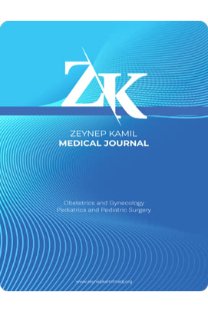Doğuma Hazırlık Eği̇ti̇mi̇ni̇n Gebelerde Prenatal Bağlanma ve Depresyon Ri̇ski̇ Üzeri̇ne
Effect of Birth Preperation Training on Prenatal Attachment and Depression
___
- Taşkın L. Doğum ve Kadın Sağlığı Hemşireliği, Sistem Ofset Matbaacılık, Ankara, 2016, 166-170.
- Altun E. Adölesan Gebelere Verilen Planlı Eğitimin Benlik Saygısı ve Bebeği Algılaması Üzerine Etkisi (Doktora Tezi). İstanbul, İstanbul Üniversitesi, 2003.
- Taşdemir S, Kaplan S, Bahar A. Doğum Sonrası Depresyonu Etkileyen Faktörlerin Belirlenmesi, Fırat Sağlık Hizmetleri Dergisi 2006; 1(2):106–116.
- Berle JI, Mykletun A, Daltveit AK, Rasmussen S, Holsten F & Dahl AA. Neonatal outcomes in offspring of women with anxiety and depression during pregnancy. A linkage study from The Nord-Trondelag Health Study (HUNT) and Medical Birth Registry of Norway. Arch Women Ment Health 2005;8, 181-89.
- Llewellyn M, Stowe Z & Nemerrof D. Depression During Pregnancy and The Puerperium. Journal of Clinical Psychiatry 1997;58, 26-32.
- Fonagy P. Introduction to attachment theory. In: P. Fonagy (Editor). Attachment theory and psychoanalysis. Newyork: Other Press, 2001, 5-18.
- Muller ME. The development and testing of the prenatal attachment inventory. Western Journal of Nursing Research, 1993; 15:199-211 16.
- Maternal Emotional Wellbeing and Infant Development: A Good Practice Guide For Midwives. The Royal Collage of Midwives (RCM), 2012. https://www.rcm.org.uk/sites/default/ files/Emotional%20Wellbeing_Guide_WEB.pdf
- Hisli N. Beck Depresyon Envanterinin üniversite öğrencileri için geçerliği, güvenirliği. Psikoloji Dergisi 1989; 7:3- 13.
- Yılmaz SD, Beji NK. Turkish version of prenatal attachment inventory: a study of reliability and validity. Anadolu Hemşirelik ve Sağlık Bilimleri Dergisi 2013;16(2):103- 9.
- Siddiqui A, Hägglöf B. Does maternal prenatal attachment predict postnatal mother- infant interaction? Early Hum Dev 2000;59(1):13-25.
- Della Vedova AM, Dabrassi F, Imbasciati A. Assessing prenatal attachment in a sample of Italian women. J Reprod Infant Psyc 2008;26(2):86-98
- Da Costa D, Larouche J, Dritsa M & Brender W. Psychosocial correlates of prepartum and postpartum depressed mood. J Affect Disord, 2000; 59, 31-40.
- Marcus SM, Flynn HA, Blow FC, Barry KL. Depressive symptoms among pregnant women screened in obstetrics settings. J Women’s Health 2003;12:373- 380.
- Sevindik F. Elazığ ilinde gebelikte depresyon prevelansı ve etkileyen faktörler (Yüksek lisans tezi). Elazığ Fırat Universitesi, 2005.
- Karaçam Z, Ançel G. Depression, anxiety and influencing factors in pregnancy: a study in a Turkish population. Midwifery 2009; 25, 344-56.
- Diego MA, Field T, Hernandez-Reif M, Schanberg S, Kuhn C, Gonzalez-Quintero VH. Prenatal Depression Restricts Fetal Growth. Early Hum Dev 2009; 85, 65-70.
- Hung C. The psychosocial consequences for primiparas and multiparas. Kaohsiung J Med Sci 2007; 23: 352-360.
- Shorey S, Chan W, Chong Y, He H. Maternal parental self-efficacy in newborn care and social support needs in Singapore: A correlational study. J Clin Nurs 2013; 23: 2272- 2283.
- Akbaş E, Vırıt O, Kalenderoğlu A, Savaş AH, Sertbaş G. Gebelikte sosyo-demografik değişkenlerin kaygı ve depresyon düzeyleriyle ilişkisi. Nöropsikiyatri Arşivi 2008;45, 85-91.
- Bloom KC. The development of attachment behaviors in pregnant adolescents. Nurs Res 1995; 44(5):284-289.
- Lindgren K. Relationships among maternal-fetal attachment, prenatal depression, and health practices in pregnancy. Res Nurs Health 2001; 24(3):203-217.
- Yılmaz S. Perinatal Kayıp Deneyiminin Sonraki Gebelik Üzerine Etkileri (Doktora Tezi). İstanbul, İstanbul Üniversitesi, 2012.
- Alan H. Doğum sonrası dönemde sosyal desteğin anne bebek bağlılığına etkisi (Yüksek Lisans Tezi). Konya, Selçuk Üniversitesi, 2011.
- Eriş B. Ergen Annelerde Ebeveynlik Yeterliliğinin Arttırılmasında İlişkisel-Gelişimsel Yaklaşım Modelinin Uygulanması (Doktora Tezi). İzmir, Ege Üniversitesi, 2007.
- ISSN: 1300-7971
- Yayın Aralığı: 4
- Başlangıç: 1969
- Yayıncı: Ali Cangül
Doğuma Hazırlık Eği̇ti̇mi̇ni̇n Gebelerde Prenatal Bağlanma ve Depresyon Ri̇ski̇ Üzeri̇ne
YASEMİN AYDIN KARTAL, Tuğba KARAMAN
Hematolojik Bulgular Olmadan Vitamin B12 Eksikliği
Sema ATEŞ, Feyza Mediha YILDIZ, Erdal SARI, Sevcan KAYAŞ
Özge Kaymaz TAKMAZ, Ali DOĞUKAN ANĞIN, Zehra Meltem PİRİMOĞLU
Over Kanseri̇ne Yöneli̇k Fotodi̇nami̇k Terapi̇ Temelli̇ Kombi̇nasyon Terapi̇ Uygulaması
S Sibel ERDEM, Vildan AKGUL OBEIDIN, Rabia Edibe PARLAR, Ubeydullah ŞAHİN
Ailevi Akdeniz Ateşi Olan 40 Gebenin Perinatal Sonuçları
Ebru Alici DAVUTOGLU, Ayşegül ÖZEL, HAKAN ERENEL, Rıza MADAZLI
4500 gram ve üstü fetusların maternal ve fetal sonuçları: tek merkez deneyimi
Türkiyede Aşılamada Güncel Sorunlar
İbrahim ŞİLFELER, Özge GEL, Pınar ÖZDEMİR, Atilla CİFCİ
Gebelikte Kullanılan Sigara Dozunun Maternal ve Fetal Sonuçlar ile İlişkisi
Çiğdem YAYLA ABİDE, EBRU ÇÖĞENDEZ, PINAR KUMRU, EVRİM BOSTANCI ERGEN, Çetin KILIÇÇI
FLUVASTATİNİN TAVŞAN KAROTİD ARTERİ YAKA MODELİNDE İNTİMAL KALINLAŞMA ÜZERİNE ETKİLERİ
Mehmet Zuhuri ARUN, Gülnur SEVİN, Şule AYLA, Gülperi ÖKTEM, Günay YETİK ANACAK, Levent ÜSTÜNES
Epilepside Gebelik, Doğum ve Doğum Sonu Sürecin Yönetimi ve Bakımı
